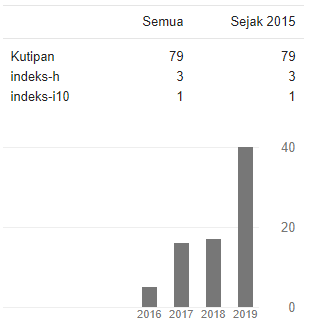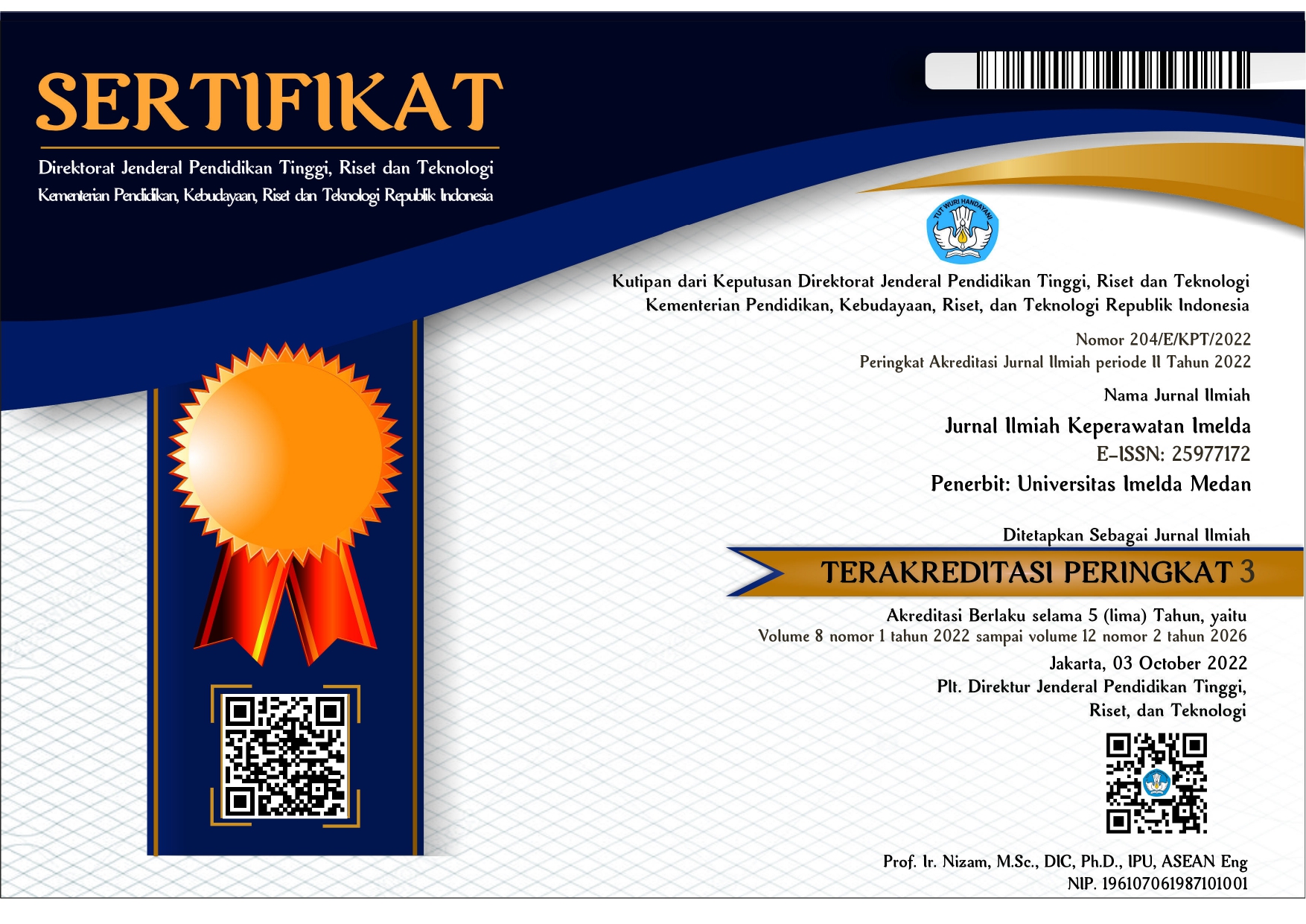PENGARUH HEALTH EDUCATION TERHADAP PENGETAHUAN DAN PERSEPSI PASIEN SEBELUM CAPSULE ENDOSKOPI DI RS PLUIT
DOI:
https://doi.org/10.52943/jikeperawatan.v10i2.1635Keywords:
Capsule Endoscopy, Health Education, Knowledge, PerceptionAbstract
Background: Capsule endoscopy is a non-invasive diagnostic procedure to examine the upper digestive tract (small intestine). Capsule endoscopy examinations are still rarely performed by patients for various reasons. Therefore, it is necessary to increase knowledge and perception. The aim of this research is to determine the characteristics of respondents based on knowledge and perception Research Method: using a cross sectional design. The population in the study were all internal medicine patients at Pluit Hospital, totaling 36 samples. The research sample consisted of 36 people divided into 2 groups with a ratio of 18 respondents in the intervention group and 18 respondents who did not receive intervention or the control group. The research time was from May 2023 to January 2024 with side purpose sampling technique. The intervention carried out was providing education to the control group and instruments used to collect data using questionnaires. Data analysis was carried out univariately and bivariately using the Wilcoxon Test and the Mann - Whitney Test. Research Results: show that there is an influence of Health Education on patient knowledge and perceptions (p value 0.004). Conclusion: Providing Health Education can influence respondents' knowledge and perceptions about carrying out capsule Endoscopy examinations. The recommendation given is that patients should be given Health Education by medical personnel who are experts in each field, such as in this study, nurses who are experts and work in the diagnostic room..
Downloads
References
Abraham, C., & Sheeran, P. (2014). The health belief model. In Cambridge Handbook of Psychology, Health and Medicine, Second Edition (pp. 97–102). Cambridge University Press.
Athiyyah, A. F., Darma, A., Ranuh, R., & Subijanto. (2012). Peran Prosedur
Endoskopik Dalam Mendiagnosis Gangguan Pencernaan Pada Anak. Jurnal Ners, 7(2), 153–160.
Buana, C., Tarwoto, T., Bakara, D. M., Sutriyanti, Y., & Sridiany, S. (2023). implementasi health believe models dalam perilaku pencegahan komplikasi diabetes mellitus. Quality : Jurnal Kesehatan, 17(1), 10–18. https://doi.org/10.36082/qjk.v17i1.875
Elli, L., et al. (2022). Nomenclature and Definition of Atrophic Lesions in Small Bowel Capsule Endoscopy: A Delphi Consensus Statement of the International CApsule endoscopy REsearch (I-CARE) Group. Diagnostics (Basel, Switzerland), 12(7),1704. https://doi.org/10.3390/diagnostics12071704
Eghbal, S. B., Karimy, M., Kasmaei, P., Roshan, Z. A., Valipour, R., & Attari, S. M. (2020). Evaluating the effect of an educational program on increasing cervical cancer screening behavior among rural women in Guilan, Iran. BMC Women’s Health, 20(1). https://doi.org/10.1186/s12905-020-01020-7
Gunawan, D. F., Waleleng, B. J., & Polii, E. B. I. (2019). Profil pasien endoskopi gastrointestinal di RSUP Prof. Dr. R. D. Kandou periode Januari 2018 – Agustus 2019. E-CliniC, 7(2). https://doi.org/10.35790/ecl.v7i2.26834
Hirsh, B. J., Hirsch, J. S., Hmoud, H., Weintraub, S., Cha, A., Lesser, M., Huang, X., Xie, Y. Y. S., Nahrwold, R., Joshua, J., Scanlon, J., Galella, T., Singh, V., & Gianos, E. (2023). A system approach to improving guideline-directed therapy for cardio-renal-metabolic conditions: The “beyond diabetes” initiative. American Journal of Preventive Cardiology, 16. https://doi.org/10.1016/j.ajpc.2023.10
Lee, E., Shafer, L. A., Walker, J. R., Waldman, C., Michaud, V., Yang, C., … Singh, H. (2019). Information experiences, needs, and preferences of colonoscopy patients A pre-colonoscopy survey. Medicine (United States), 98 (20). https://doi.org/10.1097/MD.0000000000015738
Liu, C., Chen, X., Huang, M., Xie, Q., Lin, Q..Chen, S., & Shi, D. (2021). Effect of Health Belief Model Education onmIncreasing Cognition and Self-Care Behaviour among Elderly Women with Malignant Gynaecological Tumours in Fujian, China. Journal of Healthcare Engineering,2021. https://doi.org/10.1155/2021/1904752
Koulaouzidis, A., et al. (2021). How should we do colon capsule endoscopy reading: a practical guide. Therapeutic advances in gastrointestinal endoscopy, 14, 26317745211001983. https://doi.org/10.1177/26317745211001983
Miyazu, T., et al. (2022). Modified method of patency judgement using patency capsule prior to capsule endoscopy in clinical practice. Scientific reports, 12(1), 14335. https://doi.org/10.1038/s41598-022-18569-y
Mustofa, S., Sriyono, S., & Veterini, A. S. (2023). Kontrol Edukasi Video Visual Smartphone Berbasis Selfcare terhadap Kecemasan dan Tekanan Darah Pasien Endoskopi dengan Pelayanan Anestesiologi. Journal of Telenursing (JOTING), 5(1), 190–200. https://doi.org/10.31539/joting.v5i1.4887
O'Hara, F., & McNamara, D. (2021). Small-Bowel Capsule Endoscopy-Optimizing Capsule Endoscopy in Clinical Practice. Diagnostics (Basel, Switzerland), 11(11), 2139. https://doi.org/10.3390/diagnostics11112139
Patel, A., et al. (2022). Obscure Gastrointestinal Bleeding and Capsule Endoscopy: A Win-Win Situation or Not?. Cureus, 14(7), e27137.https://doi.org/10.7759/cureus.27137 S_KPR_2001849_Title. (n.d.).
Sa’diyah, D. R., & Surjaningrum, E. R. (2021). Health Belief Model pada Perilaku Merokok Menurut Tingkat Pendapatan. Buletin Riset Psikologi Dan Kesehatan Mental (BRPKM), 1(1), 638–648. https://doi.org/10.20473/brpkm.v1i1.26803
Yudianti, I., & Nurhayati, R. (2015). HEALTH BELIEF MODEL (HBM) DAN KETERLAMBATAN RUJUKAN KASUS GINEKOLOGI. MIKIA: Mimbar Ilmiah Kesehatan Ibu Dan Anak (Maternal and Neonatal Health Journal), 18–24. https://doi.org/10.36696/mikia.v2i1.33
Zulvana. (2018). Pengaruh Relaksasi Spirotif terhadap Tingkat Kecemasaan dan Kualitas tidur pada Lansia dengan Pendekatan Teori Comfort Kolcaba. Tesis, 77–84.








